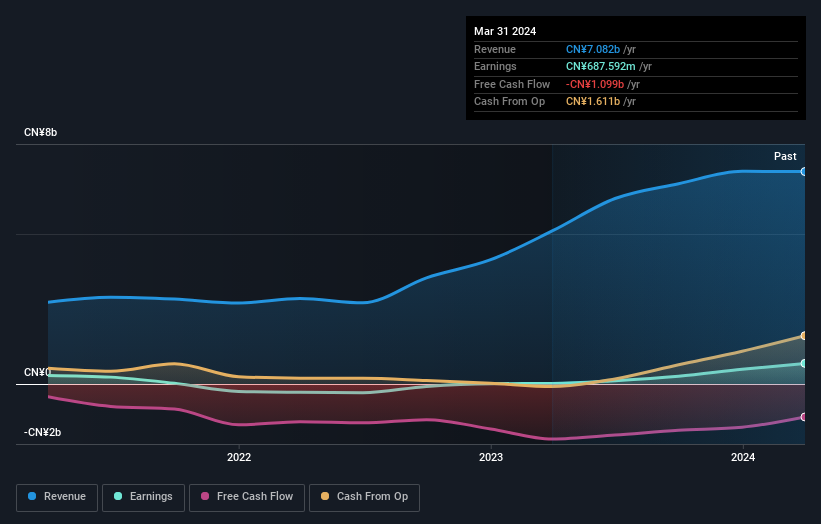- China
- /
- Renewable Energy
- /
- SZSE:000899
Institutional shareholders may be less affected by Jiangxi Ganneng Co., Ltd.'s (SZSE:000899) pullback last week after a year of 1.4% returns

Key Insights
- Significantly high institutional ownership implies Jiangxi Ganneng's stock price is sensitive to their trading actions
- 71% of the business is held by the top 2 shareholders
- Using data from company's past performance alongside ownership research, one can better assess the future performance of a company
If you want to know who really controls Jiangxi Ganneng Co., Ltd. (SZSE:000899), then you'll have to look at the makeup of its share registry. With 40% stake, institutions possess the maximum shares in the company. That is, the group stands to benefit the most if the stock rises (or lose the most if there is a downturn).
Institutional investors was the group most impacted after the company's market cap fell to CN¥8.8b last week. However, the 1.4% one-year return to shareholders may have helped lessen their pain. But they would probably be wary of future losses.
Let's delve deeper into each type of owner of Jiangxi Ganneng, beginning with the chart below.
See our latest analysis for Jiangxi Ganneng

What Does The Institutional Ownership Tell Us About Jiangxi Ganneng?
Institutional investors commonly compare their own returns to the returns of a commonly followed index. So they generally do consider buying larger companies that are included in the relevant benchmark index.
Jiangxi Ganneng already has institutions on the share registry. Indeed, they own a respectable stake in the company. This suggests some credibility amongst professional investors. But we can't rely on that fact alone since institutions make bad investments sometimes, just like everyone does. If multiple institutions change their view on a stock at the same time, you could see the share price drop fast. It's therefore worth looking at Jiangxi Ganneng's earnings history below. Of course, the future is what really matters.

Jiangxi Ganneng is not owned by hedge funds. The company's largest shareholder is Jiangxi Provincial Investment Group Co.,Ltd., with ownership of 38%. Meanwhile, the second and third largest shareholders, hold 33% and 0.5%, of the shares outstanding, respectively.
To make our study more interesting, we found that the top 2 shareholders have a majority ownership in the company, meaning that they are powerful enough to influence the decisions of the company.
While studying institutional ownership for a company can add value to your research, it is also a good practice to research analyst recommendations to get a deeper understand of a stock's expected performance. As far as we can tell there isn't analyst coverage of the company, so it is probably flying under the radar.
Insider Ownership Of Jiangxi Ganneng
The definition of company insiders can be subjective and does vary between jurisdictions. Our data reflects individual insiders, capturing board members at the very least. Management ultimately answers to the board. However, it is not uncommon for managers to be executive board members, especially if they are a founder or the CEO.
Most consider insider ownership a positive because it can indicate the board is well aligned with other shareholders. However, on some occasions too much power is concentrated within this group.
We note our data does not show any board members holding shares, personally. It is unusual not to have at least some personal holdings by board members, so our data might be flawed. A good next step would be to check how much the CEO is paid.
General Public Ownership
The general public-- including retail investors -- own 26% stake in the company, and hence can't easily be ignored. While this size of ownership may not be enough to sway a policy decision in their favour, they can still make a collective impact on company policies.
Private Company Ownership
It seems that Private Companies own 33%, of the Jiangxi Ganneng stock. It's hard to draw any conclusions from this fact alone, so its worth looking into who owns those private companies. Sometimes insiders or other related parties have an interest in shares in a public company through a separate private company.
Next Steps:
It's always worth thinking about the different groups who own shares in a company. But to understand Jiangxi Ganneng better, we need to consider many other factors. Consider for instance, the ever-present spectre of investment risk. We've identified 4 warning signs with Jiangxi Ganneng (at least 1 which doesn't sit too well with us) , and understanding them should be part of your investment process.
If you would prefer check out another company -- one with potentially superior financials -- then do not miss this free list of interesting companies, backed by strong financial data.
NB: Figures in this article are calculated using data from the last twelve months, which refer to the 12-month period ending on the last date of the month the financial statement is dated. This may not be consistent with full year annual report figures.
New: Manage All Your Stock Portfolios in One Place
We've created the ultimate portfolio companion for stock investors, and it's free.
• Connect an unlimited number of Portfolios and see your total in one currency
• Be alerted to new Warning Signs or Risks via email or mobile
• Track the Fair Value of your stocks
Have feedback on this article? Concerned about the content? Get in touch with us directly. Alternatively, email editorial-team (at) simplywallst.com.
This article by Simply Wall St is general in nature. We provide commentary based on historical data and analyst forecasts only using an unbiased methodology and our articles are not intended to be financial advice. It does not constitute a recommendation to buy or sell any stock, and does not take account of your objectives, or your financial situation. We aim to bring you long-term focused analysis driven by fundamental data. Note that our analysis may not factor in the latest price-sensitive company announcements or qualitative material. Simply Wall St has no position in any stocks mentioned.
Have feedback on this article? Concerned about the content? Get in touch with us directly. Alternatively, email editorial-team@simplywallst.com
About SZSE:000899
Jiangxi Ganneng
Engages in power generation and transmission business in China.
Proven track record with mediocre balance sheet.

